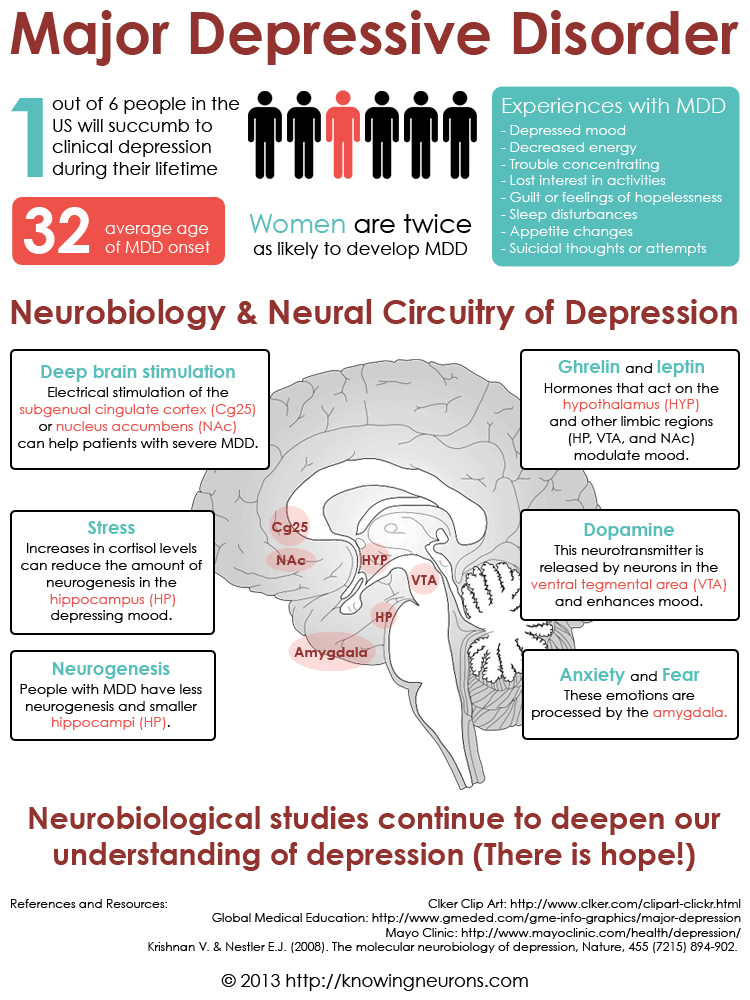In any given year, depending on demographics, about 5-12 percent of the population will experience an episode of major depression, according to the National Institute of Mental Health.
Depression, as described as a major depressive episode, can be an overwhelming experience. Over a life span, around 20 percent of the population will experience a mood disorder (depression, anxiety, bipolar disorder, etc.). This means that many people you know are living with depression, and possibly in silence.
What causes depression?
With so many people affected, it poses the question, “Where does all of this come from?” It’s a question psychologists have been asking for decades. While we have some idea of the answer, it is more complex than straightforward and the answer looks different for each person suffering from depression.
Different Types of Depression
First of all, let’s define our terms here. When we say depression, this can mean a few different things. Did you know that under the classification of Major Depressive Disorder (the hallmark depression diagnosis), there are 14 different codes (sort of more specific diagnoses) that therapists, psychologists, and psychiatrists can use? These look at different aspects of depression such as its tendency to cycle (or not), severity of the disorder, and whether or not psychotic symptoms are accompanying it. These all share in common the presence of a major depressive episode for a period of at least two weeks, which includes a depressed mood or lack of motivation.
 Another form of depression is dysthymia, which is a longer term, usually less severe level of depression. This can go on for years and years without relent, and while the severity may not be as bad in the moment, the chronic nature of dysthymia can exhaust those plagued by it.
Another form of depression is dysthymia, which is a longer term, usually less severe level of depression. This can go on for years and years without relent, and while the severity may not be as bad in the moment, the chronic nature of dysthymia can exhaust those plagued by it.
Depression can also be better explained by an adjustment disorder with depression, which basically means that something bad or stressful has happened in your life, and you have found yourself sinking into a depressed mood because of it. Over a longer course of time, this too can become a major depressive episode as well.
Finally, there can be bipolar depression, which indicates an oscillation between a depressed low and a high which might feel good, but can cause destructive actions in the long term. While depression can fit into a lot of different boxes, in general the common thread is an extended period of sadness and lack of motivation.
As you can see, when someone comes into my office saying they’ve been feeling depressed, I have to ask a lot of questions to figure out what kind of depression they are dealing with. For an adjustment disorder with depression, the cause may be more situational/environmental and this is something we can work through in therapy.
For major depressive episodes, the cause may seem more invisible, amorphous. It comes on strong and seemingly without an event to point to most often. In these instances, there is a good chance that the depressive episode is happening in large part to some chemistry going on in your brain. Should this be the case, a referral to a psychiatrist may be in order.
Possible Causes of Depression
Let’s look more in depth at a few of the possible culprits:
1. Neurotransmitters
I forget which antidepressant it was for, but do you remember the commercials of the little two-dimensional bouncing blob in black and white, frown in full force on its face? In their oversimplified visualization of depression, they did manage to do a decent job illustrating what is going on with neurotransmitters in the brain, showing little triangles floating between two knobs connected to larger neurons. At a very simple level, the illustration was trying to show that between neurons, there can be an imbalance of chemicals which affect our mood.

Neurons are the cells in the brain and body that communicate information, not too unlike a computer. Neurons fire, or don’t, and this on or off signal repeated millions of times over causes us to experience thoughts, emotions, memories, and control parts of our bodies – consciously or automatically. We know that when we have serotonin (a neurotransmitter) in abundance in our brain, our mood tends to increase. Other neurotransmitters have similar effects, such as dopamine. Anti-depressants seek to level out or create a new balance of these in our brains.
However, the brain is so complex and so many differences exist between individuals that there isn’t a great 1 to 1 response on these medications. As such, finding the right anti-depressant can take a while and be a frustrating experience. Luckily, things like improving your diet and increasing exercise can do wonders in the short term to jump start this process. If you can find the motivation in the midst of a depressive episode to get more active (often easier said than done), you might begin to see an improvement to your mood and a positive cascading effect can begin to occur.
2. Genes
Slightly related to the previous culprit, our genetics have a significant role in depression. If you have a family member with depression, specifically a parent or sibling, you are much more likely to have depression yourself. Some people just come genetically predisposed to develop it.
When genes for depression are passed on, this will in turn affect how your brain is developing and interacting with your neurotransmitters. Genes are not a perfect predictor, though. While the identical twin of someone with depression is the most likely person in their family to have depression as well, it is not necessarily a 100% correlation. Likewise, someone can develop depression without any family history of it at all. Genetics are a probability, not a direct causality, and usually work in conjunction with the next culprit.
3. Environment
I had a professor in undergraduate psychology who described it well: if your genes load the gun, your environment pulls the trigger. This means that someone with a genetic predisposition to depression is likely to get it, and in a lot of cases something environmental will cause it to actually manifest. This could be stress at work, the loss of a loved one, or literally the environment (as we often see in Seattle, especially in people moving here from sunnier climates).
Further, there is a sort of threshold to which we would expect anyone to become depressed. Constant oppression or bereavement, for example, will naturally cause someone to become depressed, at least for a time. If we think of it in terms of thresholds, then there is some individual level, probably due to some combination of genetics and upbringing, at which anyone will become depressed. This can vary and look different depending on the person, but everyone is susceptible to their environment.
4. Anemia
Another culprit for depression, anemia can be a sneaky and less understood cause of depression. Anemia causes low energy, which can lead to a lack of motivation to do things, which can cause someone to feel worse about themselves… which looks a whole lot like depression. However, in this case the issue isn’t neurotransmitters in the brain, it’s not enough iron in the blood carrying oxygen to their organs.
The psychological interpretation of this physical symptom often causes people to become sad and lose motivation, then show up to a psychiatrist’s office with all the hallmark symptoms of depression. However, regular antidepressants don’t work in this case. Often after months or years of trying to find the right medication, individuals will still feel depressed with no remittance, further piling on the sense of hopelessness that abounds in depression.
 If you have been dealing with this for a long time yourself, you might ask your psychiatrist or doctor for a blood test to see if this could be the cause of your depression. Additionally, you could try eating some iron-rich foods more regularly and to see if your mood improves.
If you have been dealing with this for a long time yourself, you might ask your psychiatrist or doctor for a blood test to see if this could be the cause of your depression. Additionally, you could try eating some iron-rich foods more regularly and to see if your mood improves.
5. Spirituality
Before I begin this next section, let me be clear: depression is not the consequence of sin or moral depravity, or your “not being close enough to God” or “not praying enough.” A lot of damage has been done over the years by writing off depression as indication that one’s spiritual life is not in place.
There are lots of people with major issues of sin in their life not feeling depressed, and good, upright individuals feeling sunken, hopeless, and sad. All that to say, it does not mean God cannot work in us and use our emotional state to point us towards Him.
Further, we may fall out of the rhythms of spirituality that have previously provided us with fulfillment, such as volunteering with church or participating in a community group. These social-spiritual connections can often do wonders to help people feel better about themselves and less depressed.
Depression may pull us away from these groups, rather than pulling away causing depression. As such, leaning into your sense of spirituality can help to increase your mood and sense of self-worth as a child of God. As I have already illustrated, there are physical things happening in our bodies that cause depression, and if we believe in a healing God, then praying for healing from emotional health should be part of our spiritual lives as well.
Treatment for Depression
Depression, in all its various forms, can be an all-consuming experience with a myriad of factors contributing to its onset. Since the causes are so varied, so then the treatments can and should be as well. Research shows that the best outcomes for the treatment of depression are through a mix of therapy and medication.
 If depression feels like being stuck in a pit, then medication is like throwing you a rope with which to climb out. You will still need to put the work in to climb out, but that task will feel much more attainable with a rope in hand than without. For some, maybe your pit is more shallow and you can do it without the medication; for others, it would be impossible without. This says nothing about you as a person or your worth, but is just a matter of where you are.
If depression feels like being stuck in a pit, then medication is like throwing you a rope with which to climb out. You will still need to put the work in to climb out, but that task will feel much more attainable with a rope in hand than without. For some, maybe your pit is more shallow and you can do it without the medication; for others, it would be impossible without. This says nothing about you as a person or your worth, but is just a matter of where you are.
Often just by coming into therapy, you have begun to get the gears turning towards your mental health recovery. A therapist might help you to identify areas in your life you can work on, or help you to uncover unhelpful semi-subconscious thoughts and beliefs you’ve been telling yourself and help you to challenge those.
Sometimes, just labeling and analyzing the experience of your depression can help you get out of it. Next, then, might be a referral to a psychiatrist who can help you dial in the right medication to help you through this. In general, though, since depression has a variety of causes, working with a therapist will help you to uncover what specifically isn’t working for you and begin to get you on the road to overcoming your depression.
“Down and out,” courtesy of Jim Jackson, pexels.com, CC0 License; Infographic courtesy of Knowing Neurons; “Victory,” courtesy of stokpic.com, pexels.com, CC0 License; “Climbing out,” courtesy of Skitterphoto, pixels.com, CC0 License





